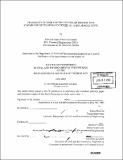| dc.contributor.advisor | Susan Murcott. | en_US |
| dc.contributor.author | Flores Cervantes, Déborah Xanat, 1978- | en_US |
| dc.contributor.other | Massachusetts Institute of Technology. Dept. of Civil and Environmental Engineering. | en_US |
| dc.date.accessioned | 2006-03-24T16:01:28Z | |
| dc.date.available | 2006-03-24T16:01:28Z | |
| dc.date.copyright | 2003 | en_US |
| dc.date.issued | 2003 | en_US |
| dc.identifier.uri | http://hdl.handle.net/1721.1/29551 | |
| dc.description | Thesis (M.Eng.)--Massachusetts Institute of Technology, Dept. of Civil and Environmental Engineering, 2003. | en_US |
| dc.description | Includes bibliographical references (leaves 98-101). | en_US |
| dc.description.abstract | A study to assess the feasibility of a novel solar water disinfection system developed by the author, Semi-Continuous Solar Disinfection (SC-SODIS), was conducted. Three aspects of SC-SODIS feasibility were considered: technical, social and economic feasibility. This study focused on developing countries and specifically, Nepal. To address the technical feasibility, field data included measuring the performance of the prototype system under climatologic conditions found in Lumbini, Nepal during the month of January 2003. The social and economic feasibilities were determined from preliminary feedback from local people and calculation of construction costs from locally available materials respectively. Results suggest SC-SODIS is a feasible technology for developing countries and specifically Lumbini, Nepal. SC-SODIS can be considered a sustainable technology as it is technically simple, effective at microbial inactivation as measured by the E.coli indicator organism, can be made from locally available materials and is economical. Preliminary feedback from locals show SC-SODIS is socio-culturally acceptable. Limited time did not allow study of the operation and maintenance problems that the system might present over the long term. | en_US |
| dc.description.statementofresponsibility | by Déborah Xanat Flores Cervantes. | en_US |
| dc.format.extent | 142 leaves | en_US |
| dc.format.extent | 6363127 bytes | |
| dc.format.extent | 6362936 bytes | |
| dc.format.mimetype | application/pdf | |
| dc.format.mimetype | application/pdf | |
| dc.language.iso | eng | en_US |
| dc.publisher | Massachusetts Institute of Technology | en_US |
| dc.rights | M.I.T. theses are protected by copyright. They may be viewed from this source for any purpose, but reproduction or distribution in any format is prohibited without written permission. See provided URL for inquiries about permission. | en_US |
| dc.rights.uri | http://dspace.mit.edu/handle/1721.1/7582 | |
| dc.subject | Civil and Environmental Engineering. | en_US |
| dc.title | Feasibility of semi-continuous solar disinfection system for developing countries at a household level | en_US |
| dc.type | Thesis | en_US |
| dc.description.degree | M.Eng. | en_US |
| dc.contributor.department | Massachusetts Institute of Technology. Department of Civil and Environmental Engineering | |
| dc.identifier.oclc | 52723321 | en_US |

